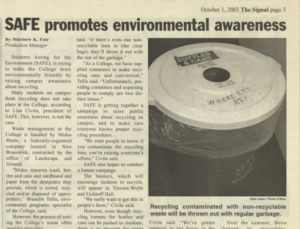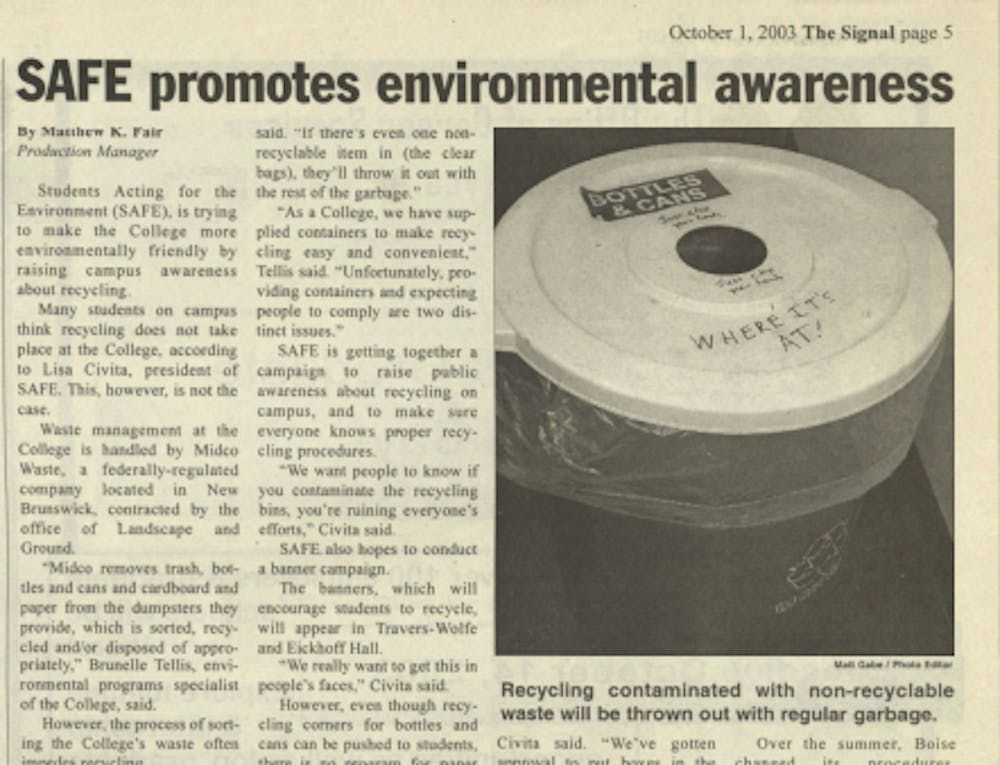By Jane Bowden
Features Editor
With Earth Day just around the corner, it’s important to practice eco-friendly habits such as shopping at the local thrift store, using reusable bags and avoiding plastic straws.
In an October 2003 issue of The Signal, a reporter wrote about the club, Students Acting for the Environment, and its efforts to improve the College’s recycling system and promote environmental awareness.

Students Acting for the Environment (SAFE) is trying to make the College more environmentally friendly by raising campus awareness about recycling.
Many students on campus think recycling does not take place at the College, according to Lisa Civita, president of SAFE. This, however, is not the case.
Waste management at the College is handled by Midco Waste, a federally-regulated company located in New Brunswick, contracted by the office of Landscape and Ground.
"Midco removes trash, bottles and cans and cardboard and paper from the dumpsters they provide, which is sorted, recycled and/or disposed of appropriately," Brunelle Tellis, environmental programs specialist of the College, said.
However, the process of sorting the College's waste often impedes recycling.
"As far as recycling goes, black trash bags are for waste and the clear ones are supposed to be for recyclables," Civita said. "If there's even one non-recyclable item in (the clear bags), they'll throw it out with the rest of the garbage."
"As a College, we have supplied containers to make recycling easy and convenient," Tellis said. "Unfortunately, providing containers and expecting people to comply are two distinct issues."
SAFE is getting together a campaign to raise public awareness about recycling on campus, and to make sure everyone knows proper recycling procedures.
"We want people to know if you contaminate the recycling bins, you're ruining everyone's efforts," Civita said.
SAFE, also hopes to conduct a banner campaign. The banners, which will encourage students to recycle, will appear in Travers-Wolfe and Eickhoff Hall.
"We really want to get this in people's faces," Civita said.
However, even though recycling corners for bottles and cans can be pushed to students, there is no program for paper recycling in residence halls — something SAFE hopes change.
"We have a project to get paper recycling in dorms," Civita said. "We've gotten approval to put boxes in the laundry rooms, and we hope to start distributing them soon."
Despite these efforts, the College has a poor record in dealing with environmental concerns, according to SAFE.
Most noticeable is the College's continued relationship with Boise Paper Solutions.
According to Civita, SAFE campaigned for the College to sever its ties with Boise, because the company was the largest violator in terms of cutting down old growth forests.
Over the summer, Boise changed its procedures, attempting to become more ecologically friendly.
The group elicited the help of the office of Environmental Services.
"The only input, which has had little or no student support, to advance recycling efforts on campus has come from SAFE," Tellis said.
"Education and cultural change is imperative and can only be achieved with the help of organizations like SAFE.”







